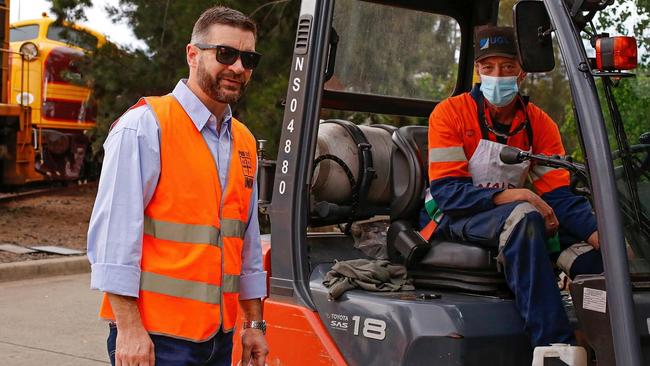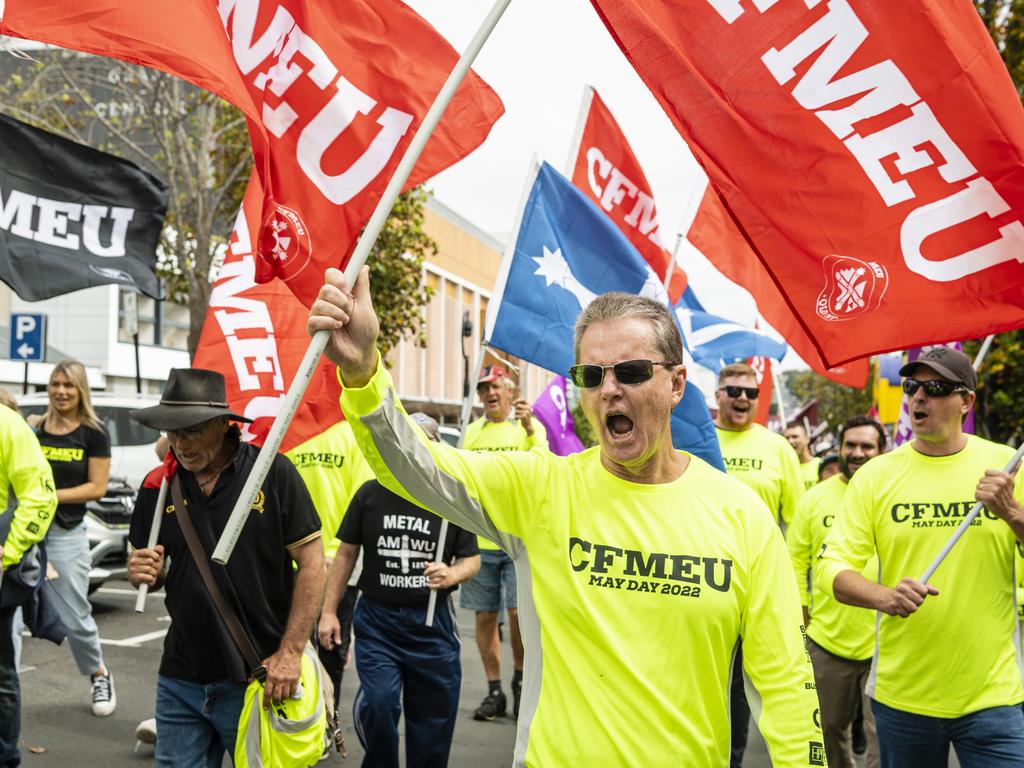Union warns of 8 per cent pay claims, more strikes
A key union is threatening to pursue big pay increases amid warnings of more strikes by workers angry at ‘low-ball’ wage offers.

A key national union is threatening to pursue wage increases of 8 per cent in response to rising inflation, as unions warn of more strikes by workers angry at employers for what they claim are “low-ball” wage offers.
Australian Manufacturing Workers Union national secretary Steve Murphy revealed to The Australian that his union would examine pursuing 8 per cent pay rises, sparking warnings from employers - who are battling against increasing costs - that the union tactics would lead to thousands of job losses and cuts to employee hours.
The AMWU and the United Workers Union said there was increasing support among workers to take industrial action against companies offering pay rises below 3 per cent that amounted to real wage cuts, given the rising cost of living.
Business groups on Sunday said unsustainable wage claims risked a “return to the dark days of the 1970s and early 80s” as employers struggled with labour shortages, supply chain problems and the global energy crisis.
The 8 per cent claim floated by the AMWU follows RBA governor Philip Lowe in June saying wage rises above 3.5 per cent would be fine for some workers but pay increases in the 4-5 per cent range would make it harder to return inflation to 2.5 per cent.
Jim Chalmers said wages were not the reason for the current high inflation and he did not share employer concerns about a “destructive wages spiral”.
Mr Murphy said if inflation in Australia hit 7 per cent as forecast by the Reserve Bank, the union would consider pursuing 8 per cent claims. “I think that’s one of the things we have to contemplate,” he said.
“The argument that it’s not affordable is dead in the water. The argument that employers don’t have the money is dead in the water.
“We are seeing what is happening with CEOs’ salaries and inflation is hitting 7 per cent. The cause of that is not because workers’ wages are growing, it’s something else … if this inflation is happening, we have to make sure workers wages don’t go backwards.”
Mr Murphy said the metalworkers’ union in Germany, where inflation has recently been as high as 7.9 per cent, had called for pay rises of 8 per cent for millions of workers. “Our (Australian) members are saying we should be putting 8 (per cent) on the table if we want to keep above inflation because the boss will want to pull us back,” he said.
“Workers have had wage stagnation for over 10 years. Inflation is already at over 5 per cent and all economists are signalling it’s going to get to 7 (per cent).
“The German metal workers have put their claim as 8 per cent.
“I guess the context to put it in is AMWU members all across the country are angry about the fact that wages aren’t keeping up with the cost of living and it’s likely that we will have a closer look at the German metalworkers’ claim in terms of what we do in Australia.”
Asked whether the AMWU would consider 8 per cent claims in bargaining, he said: “If we can’t get better outcomes in bargaining, we will need to consider a universal claim and go out there and be militant about prosecuting that.
“We will talk to the German metalworkers about how they came up with their claim, and that will be one of those things we may have to consider.”
Australian Industry Group chief executive Innes Willox said wage claims of 6-8 per cent were becoming more common, as were threats of industrial action if they were not paid.
“Unions are making it clear the days of some restraint are over in favour of reckless claims they know many employers can’t afford,” he said.
“Some unions seem to be suffering collective amnesia that we are still recovering from the greatest economic upheaval in a century; that we are still seeing massive Covid disruption; that we are seeing inflation spiralling; that businesses are being crippled by energy bill shocks; and that we are seeing hundreds of businesses close their doors every month across key sectors of the economy.
“Everyone wants and deserves a pay increase but rises of the scale unions are demanding will only see thousands of people lose their jobs or have their hours pared back.”
Australian Chamber of Commerce and Industry chief Andrew McKellar said an 8 per cent wages claim was unreasonable, unconscionable and excessive.
“The Reserve Bank has already sounded the alarm about a wage-price spiral – anything above 3.5 per cent in the current environment will put pressure on inflation. If the RBA is forced to adopt more aggressive rate rises, that brings serious consequences,” he said.
“Businesses of all sizes are tackling the impact of a labour shortage, an energy price spike and supply chain disruptions.
“Industrial action would only add to supply chain problems, adding further pressure to prices and putting the economy on a collision course with catastrophe.
“Hitching unrestrained wage hikes to spiralling inflation would be a runaway train. What Australia needs now is for cooler heads to prevail until the global economic situation is clearer.”
Mr Murphy said employers were generally willing to offer pay rises only of below 3 per cent and he expected more industrial action by workers.
“That just seems to be the automatic thing that workers are going to do now,” he said. “To be frank, getting workers ready to take industrial action was taking quite a bit of time because they know they lose money to go on strike. It generally took you a bit of time to convince workers to start taking collective action. Now it’s workers suggesting to us that the solution to it is that they need to be on strike. It’s coming up in first and second meetings when we are giving report backs on bargaining.”
UWU national secretary Tim Kennedy said employers were being deliberately stubborn and not “making offers with a three in front of it, let alone a five … If employers stick to 2½, they are going to have big problems.
“They are in a phase right now where they don’t want to pay any more and they are kind of wriggling and twisting but ultimately they are going to have to,” he said.







To join the conversation, please log in. Don't have an account? Register
Join the conversation, you are commenting as Logout